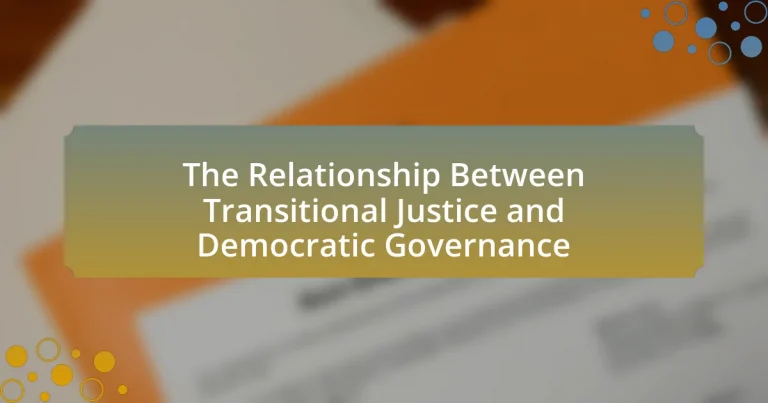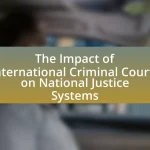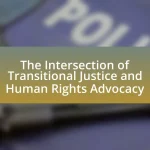Transitional justice is a critical framework aimed at addressing past human rights violations and promoting accountability, which is intrinsically linked to the establishment and sustainability of democratic governance. This article explores the mechanisms of transitional justice, such as truth commissions, reparations, and accountability measures, and their role in fostering trust in state institutions and enhancing the rule of law. It examines key components that influence democracy, the importance of public participation, and the challenges faced in implementing transitional justice within democratic contexts. Additionally, the article highlights best practices for integrating transitional justice into governance and the implications for legislative processes, judicial independence, and civil society engagement.
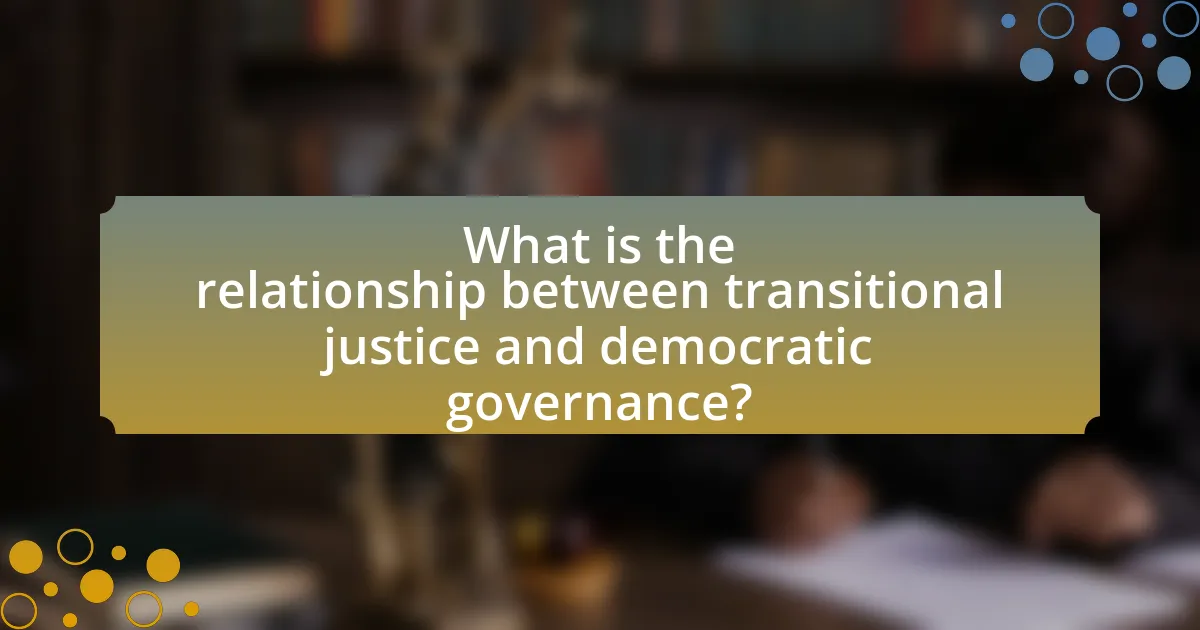
What is the relationship between transitional justice and democratic governance?
Transitional justice is fundamentally linked to democratic governance as it aims to address past human rights violations and promote accountability, thereby fostering a stable democratic environment. By implementing mechanisms such as truth commissions, reparations, and criminal prosecutions, transitional justice seeks to restore trust in state institutions and ensure that citizens feel their rights are protected. For instance, countries like South Africa, through its Truth and Reconciliation Commission, demonstrated how addressing historical injustices can facilitate a smoother transition to democracy and enhance public confidence in governance. This relationship underscores that effective transitional justice not only aids in healing societal wounds but also strengthens the foundations of democratic governance by promoting rule of law and human rights.
How do transitional justice mechanisms support democratic governance?
Transitional justice mechanisms support democratic governance by promoting accountability, fostering reconciliation, and ensuring the rule of law in post-conflict societies. These mechanisms, such as truth commissions and trials, address past human rights violations, which helps to build trust in governmental institutions. For instance, the South African Truth and Reconciliation Commission facilitated a peaceful transition from apartheid to democracy by allowing victims to share their experiences and perpetrators to confess their crimes, thereby reinforcing the legitimacy of the new democratic government. Additionally, transitional justice mechanisms contribute to the establishment of legal frameworks that uphold human rights, which are essential for sustaining democratic governance.
What are the key components of transitional justice that influence democracy?
The key components of transitional justice that influence democracy include truth-seeking, accountability, reparations, and institutional reform. Truth-seeking mechanisms, such as truth commissions, promote transparency and foster public dialogue about past injustices, which is essential for building trust in democratic institutions. Accountability measures, including trials for perpetrators of human rights violations, reinforce the rule of law and deter future abuses, thereby strengthening democratic governance. Reparations provide recognition and restitution to victims, contributing to social cohesion and stability, which are vital for a functioning democracy. Lastly, institutional reform, such as restructuring the police and judiciary, ensures that these bodies uphold democratic principles and protect human rights, further embedding democracy in the society. These components collectively create an environment conducive to democratic development by addressing past grievances and promoting justice and equality.
How does accountability in transitional justice promote democratic values?
Accountability in transitional justice promotes democratic values by ensuring that perpetrators of human rights violations are held responsible for their actions, thereby reinforcing the rule of law. This process fosters public trust in institutions, as it demonstrates a commitment to justice and equality before the law. For instance, countries like South Africa, through its Truth and Reconciliation Commission, showcased how accountability can facilitate national healing and promote democratic governance by acknowledging past atrocities and providing a platform for victims to share their experiences. Such mechanisms not only deter future violations but also encourage civic engagement and participation, essential components of a healthy democracy.
Why is transitional justice essential for post-conflict societies?
Transitional justice is essential for post-conflict societies because it addresses the legacies of past human rights violations and fosters reconciliation. By implementing mechanisms such as truth commissions, reparations, and accountability for perpetrators, transitional justice helps to restore trust in institutions and promote social cohesion. Historical examples, such as South Africa’s Truth and Reconciliation Commission, demonstrate how transitional justice can facilitate healing and prevent the recurrence of violence by acknowledging victims’ experiences and promoting a shared narrative of the past. This process is crucial for establishing the rule of law and supporting democratic governance in societies emerging from conflict.
What role does truth-telling play in fostering democratic governance?
Truth-telling plays a crucial role in fostering democratic governance by promoting transparency, accountability, and trust among citizens and institutions. When governments acknowledge past injustices and provide accurate accounts of historical events, they create a foundation for informed public discourse and civic engagement. For instance, truth commissions, such as South Africa’s Truth and Reconciliation Commission, have demonstrated that revealing the truth about human rights violations can help heal societal divisions and build a more inclusive political environment. This process not only validates the experiences of victims but also encourages a culture of openness, which is essential for the functioning of a healthy democracy.
How does reparative justice contribute to societal healing and democracy?
Reparative justice contributes to societal healing and democracy by addressing historical injustices and fostering reconciliation among affected communities. This approach acknowledges the harm done to individuals and groups, facilitating a process of recognition and accountability that is essential for rebuilding trust in democratic institutions. For instance, countries like South Africa implemented reparative justice measures post-apartheid, which included truth commissions that allowed victims to share their experiences, thereby promoting collective healing and understanding. Such initiatives have been shown to reduce social tensions and enhance civic engagement, ultimately strengthening democratic governance by ensuring that all voices are heard and valued in the political process.
What challenges exist in implementing transitional justice in democratic contexts?
Implementing transitional justice in democratic contexts faces several challenges, including political resistance, societal divisions, and the balancing of justice with stability. Political leaders may resist transitional justice measures due to fear of losing power or facing accountability, as seen in countries like Colombia, where ongoing peace negotiations complicate the pursuit of justice for past atrocities. Societal divisions can hinder consensus on the need for transitional justice, as communities may have differing views on accountability and reconciliation, exemplified in post-apartheid South Africa, where tensions between various groups persist. Additionally, democracies often grapple with the challenge of ensuring that justice processes do not destabilize the political landscape, leading to a delicate balance between pursuing accountability and maintaining social order.
How do political interests affect the effectiveness of transitional justice?
Political interests significantly affect the effectiveness of transitional justice by shaping the priorities and implementation of justice mechanisms. When political leaders prioritize their own interests over genuine accountability, transitional justice processes often become compromised, leading to selective justice or impunity for certain groups. For example, in post-apartheid South Africa, the Truth and Reconciliation Commission faced challenges due to political pressures that influenced the extent of accountability for human rights violations, demonstrating how political agendas can hinder the pursuit of justice. Additionally, when transitional justice is aligned with the political interests of those in power, it may serve as a tool for legitimizing their authority rather than fostering genuine reconciliation, ultimately undermining democratic governance.
What are the risks of undermining democratic governance during transitional justice processes?
Undermining democratic governance during transitional justice processes can lead to a range of significant risks, including the erosion of public trust in institutions, the perpetuation of impunity, and the potential for renewed conflict. When transitional justice mechanisms are not aligned with democratic principles, citizens may lose faith in the rule of law and governance, as seen in countries like Venezuela, where the lack of accountability for human rights violations has contributed to widespread disillusionment with the government. Additionally, if transitional justice processes fail to hold perpetrators accountable, it can create a culture of impunity, allowing past abuses to continue unchallenged, as evidenced in post-genocide Rwanda, where selective justice undermined broader reconciliation efforts. Lastly, the absence of democratic oversight in transitional justice can exacerbate tensions and lead to instability, as demonstrated in the case of Egypt, where rushed justice measures following the Arab Spring led to increased polarization and unrest.
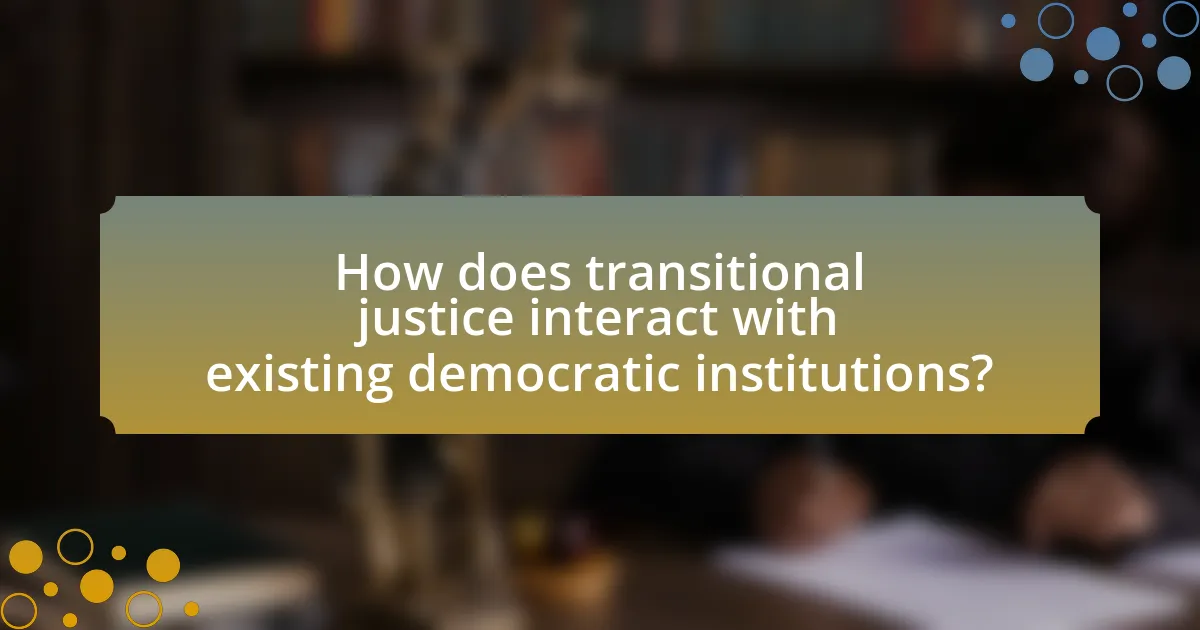
How does transitional justice interact with existing democratic institutions?
Transitional justice interacts with existing democratic institutions by reinforcing accountability, promoting rule of law, and fostering public trust in governance. This interaction is evident in post-conflict societies where transitional justice mechanisms, such as truth commissions and reparations, are integrated into democratic frameworks to address past human rights violations. For instance, in South Africa, the Truth and Reconciliation Commission was established within the democratic system to facilitate healing and accountability, thereby strengthening democratic norms. Additionally, transitional justice processes often require the involvement of judicial institutions, which can enhance their legitimacy and effectiveness, as seen in countries like Sierra Leone, where special courts were set up to prosecute war crimes while operating alongside existing legal systems.
What impact does transitional justice have on the rule of law?
Transitional justice significantly strengthens the rule of law by promoting accountability, truth, and reconciliation in post-conflict societies. By addressing past human rights violations through mechanisms such as trials, truth commissions, and reparations, transitional justice fosters a legal framework that upholds justice and deters future abuses. For instance, the establishment of the International Criminal Court has reinforced legal norms against war crimes and crimes against humanity, thereby enhancing the rule of law globally. Furthermore, studies indicate that countries implementing transitional justice measures experience improved public trust in legal institutions, which is crucial for a functioning democracy.
How can transitional justice strengthen judicial independence?
Transitional justice can strengthen judicial independence by establishing legal frameworks that promote accountability and rule of law in post-conflict societies. These frameworks often include mechanisms such as truth commissions, reparations, and trials for human rights violations, which help to rebuild public trust in the judiciary. For instance, the establishment of the International Criminal Court has reinforced national judicial systems by providing a model for prosecuting war crimes and crimes against humanity, thereby encouraging local courts to operate independently and fairly. Additionally, transitional justice processes often involve the participation of civil society, which can advocate for judicial reforms and monitor the independence of the judiciary, further solidifying its role as an impartial arbiter in society.
What are the implications of transitional justice for legislative processes?
Transitional justice significantly influences legislative processes by promoting accountability, fostering legal reforms, and enhancing public trust in governance. It compels legislatures to enact laws that address past human rights violations, ensuring that victims receive justice and reparations. For instance, in South Africa, the Truth and Reconciliation Commission led to the establishment of new legal frameworks aimed at preventing future abuses, demonstrating how transitional justice can reshape legislative priorities. Furthermore, transitional justice initiatives often require the integration of international human rights standards into domestic law, which can lead to comprehensive legal reforms that strengthen democratic governance. This relationship underscores the necessity for legislatures to actively engage in transitional justice mechanisms to build a more just and equitable society.
How do civil society organizations influence transitional justice and democracy?
Civil society organizations influence transitional justice and democracy by advocating for accountability, promoting human rights, and facilitating public participation in the justice process. These organizations often serve as watchdogs, monitoring government actions and ensuring that transitional justice mechanisms are implemented effectively. For instance, in post-apartheid South Africa, organizations like the Truth and Reconciliation Commission were pivotal in addressing past human rights violations, thereby fostering a democratic culture. Additionally, civil society groups mobilize communities to engage in dialogue about justice and reconciliation, which strengthens democratic governance by ensuring that diverse voices are heard in the policymaking process. Their involvement often leads to more inclusive and transparent systems, as evidenced by various case studies where civil society has played a crucial role in shaping transitional justice frameworks.
What role do grassroots movements play in shaping transitional justice outcomes?
Grassroots movements play a crucial role in shaping transitional justice outcomes by advocating for accountability, truth, and reparations for victims of past abuses. These movements mobilize communities, raise awareness, and influence policy decisions, ensuring that the voices of marginalized groups are heard in the transitional justice process. For instance, in South Africa, grassroots organizations were instrumental in the establishment of the Truth and Reconciliation Commission, which addressed human rights violations during apartheid. Their efforts highlighted the need for inclusive dialogue and restorative justice, ultimately impacting the country’s democratic governance. Additionally, research indicates that countries with active grassroots movements tend to have more effective transitional justice mechanisms, as these movements foster civic engagement and promote a culture of accountability.
How can public participation enhance the legitimacy of transitional justice initiatives?
Public participation enhances the legitimacy of transitional justice initiatives by fostering inclusivity and ensuring that diverse perspectives are represented in the process. When communities actively engage in transitional justice mechanisms, such as truth commissions or reparations programs, they contribute to a sense of ownership and accountability, which strengthens public trust in these initiatives. Research indicates that inclusive processes lead to higher levels of perceived legitimacy; for instance, the United Nations has emphasized that public involvement is crucial for the success of transitional justice efforts, as seen in the experiences of countries like South Africa and Rwanda, where community engagement played a pivotal role in the acceptance and effectiveness of their respective justice processes.
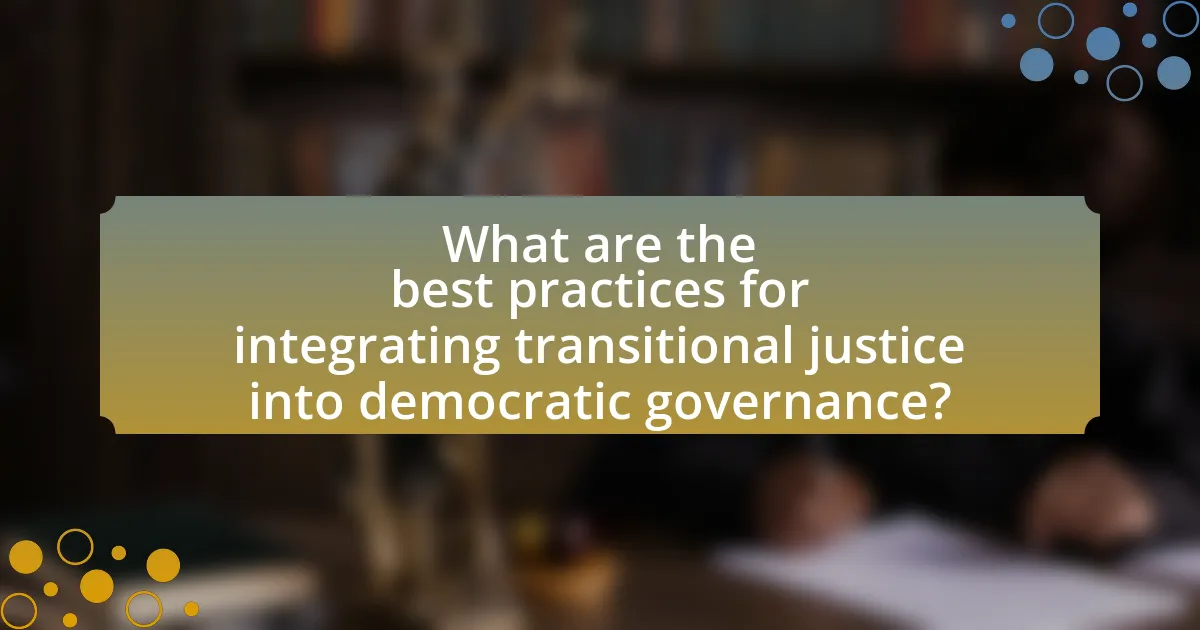
What are the best practices for integrating transitional justice into democratic governance?
The best practices for integrating transitional justice into democratic governance include establishing inclusive processes, ensuring accountability, promoting truth-telling, and fostering reparations. Inclusive processes involve engaging diverse stakeholders, including victims, civil society, and marginalized groups, to ensure that all voices are heard and represented. Accountability mechanisms, such as trials and truth commissions, are essential for addressing past human rights violations and restoring public trust in institutions. Promoting truth-telling through public hearings and documentation helps to acknowledge the experiences of victims and create a shared historical narrative. Finally, fostering reparations, both material and symbolic, is crucial for addressing the harm suffered by victims and facilitating societal healing. These practices are supported by various case studies, such as South Africa’s Truth and Reconciliation Commission, which demonstrated the importance of inclusivity and accountability in building a democratic society post-apartheid.
How can policymakers effectively design transitional justice frameworks?
Policymakers can effectively design transitional justice frameworks by ensuring inclusivity, accountability, and victim-centered approaches. Inclusivity involves engaging diverse stakeholders, including victims, civil society, and marginalized groups, to reflect the society’s complexities and needs. Accountability is crucial; frameworks should establish mechanisms for truth-telling, reparations, and legal accountability for perpetrators of human rights violations, as seen in South Africa’s Truth and Reconciliation Commission, which aimed to foster national healing while addressing past injustices. A victim-centered approach prioritizes the needs and rights of victims, ensuring their voices are heard and their experiences acknowledged, which is supported by the United Nations’ guidelines on transitional justice that emphasize the importance of victim participation. These elements collectively contribute to a framework that not only addresses past wrongs but also supports the establishment of democratic governance by promoting rule of law and social cohesion.
What lessons can be learned from successful transitional justice implementations?
Successful transitional justice implementations demonstrate the importance of inclusivity and community involvement in the process. Engaging diverse stakeholders, including victims, civil society, and marginalized groups, fosters trust and legitimacy, as evidenced by the South African Truth and Reconciliation Commission, which facilitated national dialogue and healing post-apartheid. Additionally, establishing clear legal frameworks and accountability mechanisms is crucial; for instance, the International Criminal Tribunal for the former Yugoslavia effectively prosecuted war crimes, reinforcing the rule of law and deterring future violations. Finally, integrating transitional justice into broader political and social reforms enhances democratic governance, as seen in Colombia’s peace process, where transitional justice measures are linked to comprehensive peace agreements and institutional reforms.
How can international support enhance domestic transitional justice efforts?
International support can enhance domestic transitional justice efforts by providing financial resources, technical expertise, and legitimacy to local initiatives. Financial resources from international donors can help fund investigations, legal proceedings, and victim support programs, which are crucial for effective transitional justice. For instance, the United Nations has allocated funds to support truth commissions and reparations programs in various countries, demonstrating the impact of financial backing on local efforts.
Technical expertise from international organizations can assist in developing frameworks that align with international human rights standards, ensuring that domestic processes are robust and credible. For example, the International Criminal Court has provided guidance on prosecuting war crimes, which can strengthen local judicial capacities.
Moreover, international legitimacy can bolster domestic efforts by signaling to local populations and governments that the transitional justice process is recognized and supported globally. This can encourage participation from victims and communities, as seen in South Africa’s Truth and Reconciliation Commission, which gained international attention and support, enhancing its effectiveness.
Thus, international support plays a critical role in strengthening the capacity, credibility, and inclusiveness of domestic transitional justice efforts.
What strategies can ensure the sustainability of transitional justice in democratic settings?
To ensure the sustainability of transitional justice in democratic settings, it is essential to integrate transitional justice mechanisms into the broader framework of governance and rule of law. This integration fosters accountability, promotes public trust, and encourages civic engagement. For instance, countries like South Africa have demonstrated that embedding transitional justice within democratic institutions can lead to long-term stability and reconciliation, as seen through the Truth and Reconciliation Commission’s role in addressing past injustices while supporting democratic processes. Additionally, continuous public education and participation in transitional justice initiatives can enhance legitimacy and support, as evidenced by community involvement in truth-telling processes in countries like Colombia, which has contributed to ongoing peace efforts.
How can ongoing dialogue between stakeholders promote effective transitional justice?
Ongoing dialogue between stakeholders promotes effective transitional justice by fostering collaboration, building trust, and ensuring diverse perspectives are considered in the justice process. This continuous engagement allows for the identification of shared goals and the development of inclusive policies that address the needs of affected communities. For instance, in South Africa, the Truth and Reconciliation Commission facilitated dialogue among victims, perpetrators, and the government, which helped to acknowledge past injustices and promote national healing. Such examples demonstrate that sustained communication can lead to more comprehensive and accepted transitional justice outcomes, ultimately reinforcing democratic governance by enhancing legitimacy and accountability in the justice system.
What are the key indicators of success for transitional justice in fostering democracy?
Key indicators of success for transitional justice in fostering democracy include accountability for past human rights violations, the establishment of truth commissions, and the promotion of reparations for victims. Accountability is crucial as it deters future abuses and builds public trust in institutions; for instance, the prosecution of perpetrators in countries like Argentina has contributed to democratic consolidation. Truth commissions, such as South Africa’s Truth and Reconciliation Commission, facilitate national dialogue and acknowledgment of past injustices, fostering social cohesion. Additionally, reparations programs, like those implemented in Colombia, provide recognition and support to victims, reinforcing the legitimacy of democratic governance. These indicators collectively contribute to a more just society and strengthen democratic institutions.
What practical steps can be taken to address common challenges in transitional justice?
Practical steps to address common challenges in transitional justice include establishing inclusive dialogue mechanisms, ensuring victim participation, and promoting accountability through legal frameworks. Inclusive dialogue mechanisms, such as community forums, facilitate the involvement of diverse stakeholders, which is essential for legitimacy and acceptance of transitional justice processes. Victim participation is crucial, as it empowers affected individuals and communities, ensuring their voices are heard and their needs addressed. Promoting accountability through robust legal frameworks, including the establishment of special tribunals or truth commissions, helps to deter future violations and fosters trust in the justice system. These steps are supported by evidence from various transitional justice cases, such as South Africa’s Truth and Reconciliation Commission, which highlighted the importance of inclusivity and accountability in achieving lasting peace and democratic governance.
